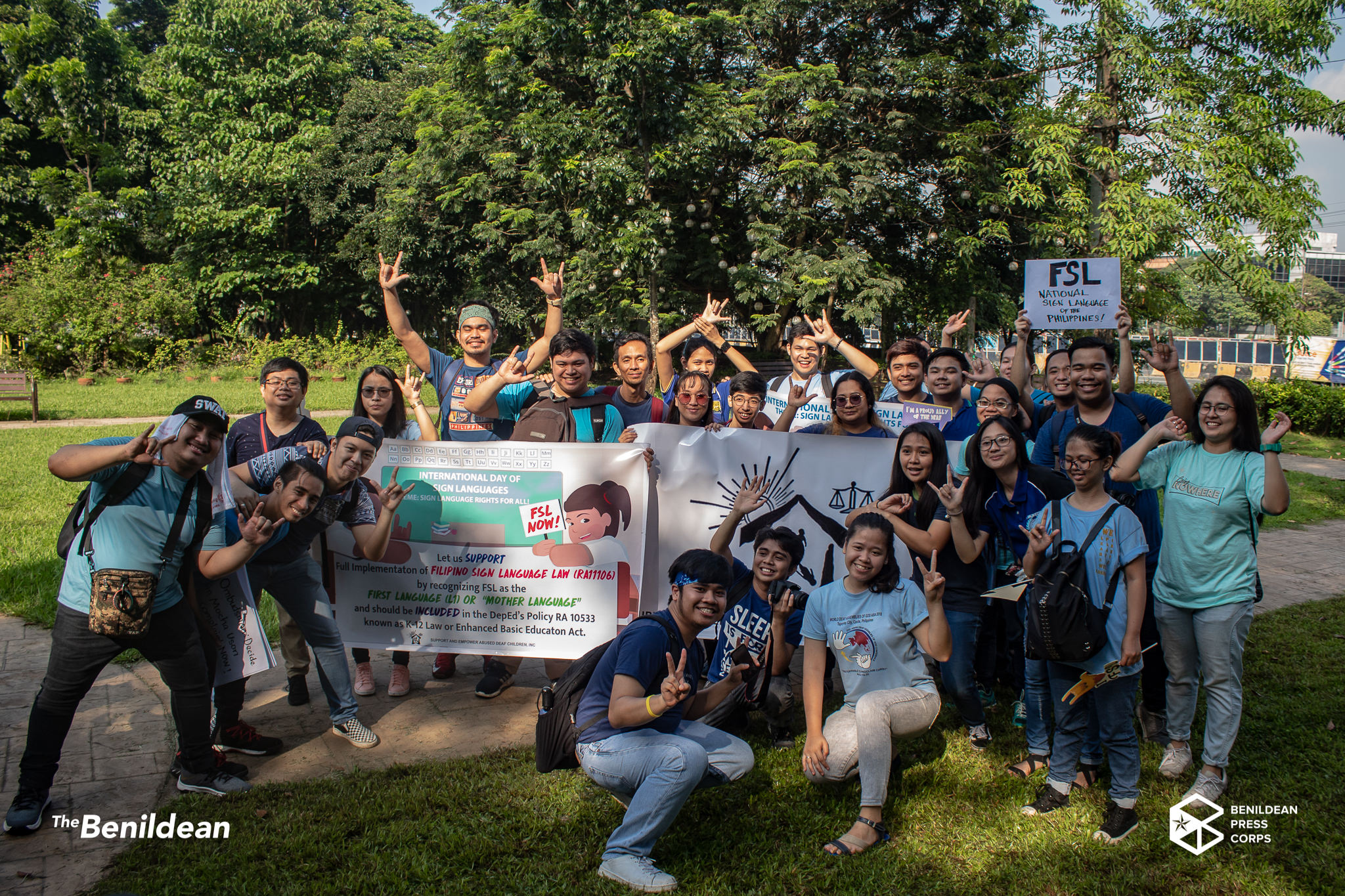The College expands its program to increase inclusion and accessibility of the Deaf Community with Bachelor in Sign Language Interpretation (BSLI), the first sign language interpreting program that will be offered by a Higher Education Institution in the Philippines.
The three-year program—one of the few sign language interpretation programs in Asia—will be offered under the School of Deaf Education and Applied Studies’ Interpreting Education Program (SDEAS-IEP).
In an interview with The Benildean, Mr. John Xandre Baliza, Philippine National Association of Sign Language Interpreters President and SDEAS Education Coordinator, mentioned the College decided to push for the creation of the program primarily because of RA 11106, more commonly known as the Filipino Sign Language law.
“Because of that law (Filipino Sign Language law), […] we see an increase for a need for sign language interpreters because it is mandated that by law to have accessibility for the Deaf people not only in schools but in all sectors: sa court, sa government transactions, sa healthcare, sa schools—so ‘yun, talagang tataas ‘yung demand for interpreters that’s why I think this is the best time para magkaroon ng ganung klaseng program [in Benilde],” Baliza stated.
Furthermore, he mentioned that according to their research, there are roughly 180 sign interpreters around the country, most of them are not working full-time, thus, a need to increase the pool of interpreters is necessary to lessen their approximate ratio of 1 interpreter per 32,000 Deaf people. Baliza also added that this program will aid in formation of full time sign language interpreters, linguists, and ambassadors for the expansion of the Filipino Sign language.
Program in the making
As the first sign language interpreting program to be offered in the Philippines’ tertiary education, there are certain processes it must go to.
Baliza mentioned that the program’s proposal, formation, and consultation commenced as early as January 2019. He spearheaded the multisectoral and technical working group that consists of Deaf community, interpreters, experts, linguists, and professionals in formulating the program and curriculum.
In addition, international organizations and their partner in the United States, the National Technical Institute for the Deaf, the first and largest technological college in the world for students who are deaf or hard of hearing, were also consulted in the process.
By October 2019, the presentation and approval per level started from the Academic Council, President’s Council, Board of Trustees, and the Commission of Higher Education (CHED).
According to Baliza, It has been approved in the academic council level to the Board of trustees level, and they are now waiting for the approval of CHED by this month, with high hopes to offer it by A.Y. 2020-2021. However, due to the Modified Enhanced Community Quarantine, the approval of CHED will be prolonged.
“Kapag na-approve ito, we will be able to market it right away then we could get—as long as we meet the minimum number of student enrollees, we could start the program by first term,” Baliza added.
The ABC’s of BSLI: Forming Cultural and Linguistic Ambassadors
Other than the program’s scope for three years, BSLI has nine terms that will cover 155 units.
According to Baliza, the program will focus on FSL but other modes of sign languages and sign modes such as the American Sign Language and International Sign will be given through workshops, seminars, and podiums as a requirement for a CSB-Life accreditation or other means. He also added that the first three Academic Years of implementation will only be offered to the Hearing to find improvements and create certain accommodations for the Deaf but after the mentioned period, the program will also be open to the Deaf for equal opportunities.
“Yung interpreting profession hindi lang naman siya para sa mga nakakarinig so we’re opening up this to widen the opportunities para din sa mga Deaf who want to become interpreters,” Baliza stated.
When asked what makes the program unique, Baliza stated the program highlights FSL’s linguistic component as a foundation to understand the history and beauty of the language, forming the prospective students as professional sign language interpreters that “have the heart to really love what they are doing (and) to serve the Deaf community.”
“We are not only developing sign language interpreters in our program, but we will be developing cultural and linguistic ambassadors,” Baliza emphasized.
Furthermore, he also added that research and English as the mode of instruction is one of their features, making them competitive in the international arena as well.
“The students will be required to undergo a research kasi currently we have no literature on sign language interpreting in the Philippines so we are hoping to contribute to that by encouraging our students to get involved on Filipino Sign Language,” Baliza mentioned.
Moreover, Baliza clarified that the new program, IEP, will be under SDEAS, “however, once the program is approved and it expands, it can become one of the sectors under SDEAS,” he stated.
Benilde’s SDEAS is currently only offering Bachelor in Applied Deaf Studies (BAPDST) with tracks in Business Outsourcing Services Management, Entrepreneurship and Visual Media Arts, making BSLI to be its second program.
Nonetheless, certificate course Filipino Sign Language Learning Program (FSLLP) is also offered to the Benildean community’s Hearing and Deaf as well as to the public.


